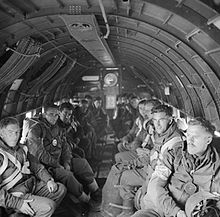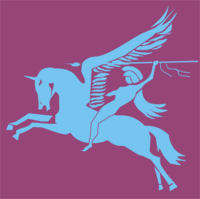
Back 2η Ταξιαρχία Αλεξιπτωτιστών (Ηνωμένο Βασίλειο) Greek 2. padalska brigada (Združeno kraljestvo) Slovenian
| 2nd Parachute Brigade | |
|---|---|
 | |
| Active | 1942–1948 |
| Country | |
| Branch | |
| Type | Airborne forces |
| Role | Parachute infantry |
| Size | Brigade |
| Part of | 1st Airborne Division 2nd New Zealand Division 8th Indian Infantry Division 6th Airborne Division |
| Engagements | Operation Slapstick Operation Hasty Operation Dragoon Battle of Monte Cassino Operation Manna Palestine |
| Commanders | |
| Notable commanders | Brigadier Ernest Down Brigadier Charles Pritchard |
| Insignia | |
| Emblem of the British Airborne Forces, Bellerophon riding the flying horse Pegasus |  |
The 2nd Parachute Brigade was an airborne forces brigade formed by the British Army during the Second World War.
The 2nd Parachute Brigade was the second parachute infantry brigade to be formed by the British Army in 1942; it was initially part of the 1st Airborne Division but in 1943, after the invasion of Italy, became an independent formation. As an independent brigade it was variously assigned at different times, and served under the command of the 2nd New Zealand Division, the 8th Indian Infantry Division, and the 1st Airborne Task Force.
Before the end of the Second World War in Europe the brigade saw active service in Italy, the South of France and Greece. At the end of the European war the brigade returned to the United Kingdom and was intended to join the 44th Indian Airborne Division in the Far East, for service against the Japanese Empire, but the war ended before they sailed. Instead the brigade was assigned to the 6th Airborne Division, which had been named the Imperial Strategic Reserve, and sent to serve in the Mandate of Palestine.
Defence cuts in the British armed forces after the war forced a reduction in the number of parachute brigades. By 1948 the 2nd Parachute Brigade was the last surviving parachute formation dating from the Second World War, all other parachute divisions and brigades having been disbanded. The last three battalions of the Regular Army comprised in the brigade returned to the United Kingdom; later in the same year the unit was posted to the British Army of the Rhine and re-designated as the 16th Independent Parachute Brigade Group.